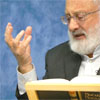Other Methods of Kabbalah
 A comment I received: I’m curious about other methods because Rav has mentioned them, and I’ve heard that there are other schools in America. In fact, the first Kabbalah book I read was written by an American author. I’m wondering what Rav thinks about other Kabbalah methods, even though I’m pretty sure that he has a negative opinion of them, judging by what he said about Madonna. Still, I’d like to know why he feels this way, and would appreciate a better explanation than “Other methods have nothing to do with Kabbalah.”
A comment I received: I’m curious about other methods because Rav has mentioned them, and I’ve heard that there are other schools in America. In fact, the first Kabbalah book I read was written by an American author. I’m wondering what Rav thinks about other Kabbalah methods, even though I’m pretty sure that he has a negative opinion of them, judging by what he said about Madonna. Still, I’d like to know why he feels this way, and would appreciate a better explanation than “Other methods have nothing to do with Kabbalah.”
My Response: Instead of talking about some other methods in particular, I’ll tell you what authentic Kabbalah is.
It’s not amulets, red strings, holy water, Tarot cards, sorcery, blessings, fortunetelling, dream interpretation, self-help, or healing. That is to say, it’s not any of the things that pertain to our world, aiming to improve one’s life or to give one control over it.
Neither is Kabbalah the study of false Kabbalistic sources, that is, texts written by people who are not recognized Kabbalists, such as philosophers, theologians, researchers, modern gurus, and others.
Moreover, Kabbalah is not when one studies authentic Kabbalistic texts in order to know what they say or to be able to “manipulate” this knowledge as if one understands it. In truth, all this is nothing more than intellectual exercises.
Furthermore, Kabbalah is not the promises that religious leaders make of a better life, a reward in this world or in the world to come, which they wrongly believe awaits man after death.
All these methods aim to receive a profit or reward from the study of Kabbalah, either in this world or in the world to come.
But authentic Kabbalah is just one thing – “the revelation of the Creator to a person.” This means that within oneself, one reveals the property of love for one’s neighbor, the property of bestowal, and rejects one’s egoism – here and now! A person stops thinking about himself, and his only motivation is to improve the situation others are in, in order to give the Creator delight.
Obviously, this is not what a person wants when he first begins to study Kabbalah. Instead, he is driven by a desire to understand the meaning and purpose of his life, to answer the question “What am I living for?” or “What is worth living for?” But as he keeps studying, he gradually starts to understand that this world, and him, exist for a reason – to attain the Creator, the property of bestowal and love.
This property, “love for others,” is absolutely opposite to one’s egoistic nature. Therefore, the goal of Creation – for one to acquire this property – becomes revealed to a person gradually, as much as he’s capable of hearing about it. To this extent, he begins to understand the Kabbalistic texts, to feel what they describe through the newly acquired property of bestowal and love.
In the article, The Essence of the Wisdom of Kabbalah, Baal HaSulam writes:
What is the wisdom of Kabbalah? To sum it all up, the wisdom of Kabbalah is the revelation of the Creator by all possible means. It’s the revelation of all His properties and manifestations, which are revealed in the worlds or which will be revealed in the future, until the end of all generations.
My Current Mood: jealous

 Laitman.com Comments RSS Feed
Laitman.com Comments RSS Feed





I pray that my desire for bestowal will be revealed in you and that I may be able to bestow upon you the gift I was given many years ago and that if you still smoke, you will be utterly and completely relieved of this desire. Please rest yourself. Ahava to you my dear one.